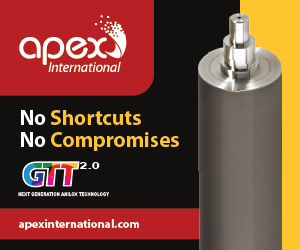Experience Speaks | Q&A with Brett York
- Published: March 01, 2016
 Essentra's president of the Americas shares his thoughts on what it takes to be a successful leader.
Essentra's president of the Americas shares his thoughts on what it takes to be a successful leader.
- Brett York, President of the Americas
- Essentra, Westchester, IL; corporate headquarters in the UK
- Number of plants: 69 globally; 16 in the Americas
- Year founded: 1940s
- Number of employees: 9,000 globally; 2,400 in the Americas
- Specialization: Cartons, labels, leaflets, and printed foils and papers for primary packaging applications
- www.essentra.com
How would you describe your management style? My management style is one of a “head coach.” I have to adjust sometimes, to suit the people I work with and the situation, but I like to keep a consistent style and provide direction and encouragement.
What is your key to retaining good employees? The key to retaining good employees is to hire good people in the first place. I strongly believe if those you hire align with the corporate culture, then retaining them will be less of an issue. Catering to millennials can be a challenge because it demands a different approach. They have a unique mindset, often prioritizing a progressive, flexible corporate environment over other aspects, such as compensation. At Essentra, our graduate program gives a group of talented, young people the chance to experience the range of opportunities which an international group like Essentra can offer, interact with other like-minded graduates their age, and travel the globe. We recruit from higher education institutions across the United States including the likes of the engineering school at Penn State Behrend, for example.
What is the key to growing a business in a bad economy? It’s all about driving new revenue streams. Whether economic conditions are stronger or weaker, it is always important to continually review the business strategy in order to grow and stay ahead of the market. For example, Essentra recently shifted from a divisional to a regional business structure which has transformed our ability to service and cross-sell to clients in our targeted end-markets, and has generated us over half a million selling opportunities in a challenging economy.
What is the biggest challenge/threat to the converting industry right now? While I consider these threats more of an opportunity for growth than anything else, I see two key challenges. The first is staying ahead of consumer behavior as it changes and evolves. The second is meeting global demand in a fast-moving marketplace.
To address the first point, changing consumer behavior—as it relates to how customers consume information and where they purchase products—is shaking up the industry. It’s certainly impacted the packaging of the products they purchase—from primary to secondary and even the outer shipping materials. This mega-trend will drive changes in design, materials, and converting.
 Secondly, the decompression of lead times—faster and quicker—and then shorter runs. What’s happening in the pharmaceutical industry, for example, is that customers are coming out with more niche drugs, distributed in small volumes, across multiple markets. Previously, you would set up a certain product and you’d run it for a week. Now, the conversation runs more along the lines of: “I’ve got this DNA drug that treats cancer and I need 10 cases of that shipped to 50 countries.”
Secondly, the decompression of lead times—faster and quicker—and then shorter runs. What’s happening in the pharmaceutical industry, for example, is that customers are coming out with more niche drugs, distributed in small volumes, across multiple markets. Previously, you would set up a certain product and you’d run it for a week. Now, the conversation runs more along the lines of: “I’ve got this DNA drug that treats cancer and I need 10 cases of that shipped to 50 countries.”
It’s more challenging to oversee thousands of shipments, as opposed to millions because it’s difficult to anticipate demand. For example, if you send 50 to Malaysia and then 10 to France, you may sell out in France and need 10 more. And then there are different language requirements, so there’s less commonality and more divergence—all of which means reduced reaction time.
The new technology and system we’ve introduced to handle this short-window business is called small run lanes. When an order comes into our factories, it is given to a work cell, separate from the main factory, where our best employees have been assigned to get the most effective, fastest results. We’ve introduced this approach in Europe where it’s been a success, so we’re going to roll it out in the U.S. in order to take advantage of the current market opportunity and learnings.
To what associations does your company belong? Essentra belongs to the Institute of Packaging Professionals (IOPP), Point of Purchase Advertising International (POPAI), and Pressure Sensitive Tape Council (PSTC). All of these associations help us network within our industry and keep up with key trends.
What do you know now that you wish you had known when you started out in business? When I first started out, I didn’t understand the value of a clear strategy and vision. Over time, I’ve realized both of these aspects bring clarity to the whole organization. It’s important, at every level, to know why you wake up in the morning, because understanding how your work fits into the bigger picture and the mission of the company is critical to performance.
What was the best advice you ever got? Confront the brutal facts.
What are you most proud of in your business? We’ve undergone a complete transformation at Essentra, and I’m so proud to have been a part of it. Taking four different global product divisions and formulating a coherent “Group” strategy which is relevant to customers in the Americas region is an enormous job, and we’re now in a position where we can grow faster than ever. We’ve unified parts of the business which had previously been siloed, sharing our best practices and ideas across one organization. It’s all helped us rebrand as one cohesive business that goes beyond our healthcare packaging capabilities, to focus on what’s most important to us—our customer relationships.
Do you have a personal motto or mantra by which you live life or do business? Attitude is everything.
What does your company do for your customers that makes them come back to enjoy the experience of doing business with you again? One thing that is common among most of our products is reliability in terms of delivery and quality. Our global footprint combined with our local sales teams provides customers with the products they require when and where they need them.
What do you feel are the key qualities necessary to be a successful leader? In short—great leaders are a mix of personal humility and professional will.











